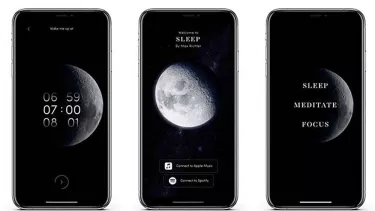Could this 8-hour lullaby help you conquer a good night’s sleep?
Sleep expert Professor Danny Eckert, in discussion with neuroscientist and Max Richter collaborator David Eagleman, dives into the power and beauty of a full night’s rest, ahead of the streaming debut of Richter’s Sleep.
Sleep is mysterious and beautiful and so too is Max Richter's composition Sleep, an eight hour lullaby written to accompany a full night's sleep. However, for the four out of 10 Australian adults who have inadequate sleep on a regular basis, the quest for a full night, and the powerful restorative benefits that accompany it, remains elusive. There are many potential causes of inadequate sleep, from the demands of today’s 24-hour society (nearly 20% of Australian workers are shift workers), to common medical conditions such as chronic back pain, to sleep disorders and lifestyle choices. When Richter wrote Sleep, he created a suite of music that attempted to both enable and emulate a good night’s sleep, going so far as to work with neuroscientist and author David Eagleman.
“We had a long conversation about the rhythmic quality of neurons in the brain during deep sleep – how they link their activity and move up and down in synchrony at a particular pace,” Eagleman explains. “Max strove for something that hit a sweet spot between familiarity and novelty: one that would neither be pure repetition nor would startle the sleeper with too much unpredictability.”

Yet, for many of us, our sleep is defined by unpredictability. And at one time or another we have all experienced the immediate next day adverse consequences that accompany insufficient or poor-quality sleep. These can include fatigue, inability to think clearly, lack of motivation, having a ‘short fuse’, headaches, gastrointestinal discomfort, the list goes on. Indeed, thanks to the science of sleep, we now know that the function of virtually every organ in the body and in fact every cell in the body is impaired with inadequate or disrupted sleep. For example, if you stay awake for 19 hours in a row your performance and alertness decrease to levels equivalent to a blood alcohol concentration of 0.05%. If you extend to 24 hours awake, it increases to 0.1%, double the legal limit for driving. Alternatively, if you restrict sleep to just five hours for five nights in a row, performance and alertness corresponds to a blood alcohol concentration of 0.05%.
Beyond performance and alertness, if you measure blood glucose and testosterone levels before and after five nights of five hours sleep in an otherwise healthy young man, glucose control diminishes to a level comparable to a prediabetic state and testosterone levels fall as though he has aged a decade. These are just a few examples of why prioritising enough time to get sufficient good quality sleep on a regular basis is essential for optimal health and wellbeing.

But what exactly is sleep? Why is it so important? How much do we need? And what can we do if we experience problems with our sleep? These questions underpin the growing field of sleep medicine and are especially timely as we navigate our way through the ongoing uncertainty of the COVID-19 pandemic. To tackle the first question, biologically, sleep is a dynamic process controlled by the brain. Rather than being static, sleep more closely resembles a roller coaster ride where roughly every 90 minutes we cycle through light, deep and rapid eye movement or ‘REM’ sleep. Many people may be surprised to learn that it is completely normal for a healthy 50-year-old to wake up 20 times per hour. Thankfully though each of these brief awakenings last only for a few seconds and we are typically unaware that they have occurred.
We also now know that certain parts of the brain fall asleep faster than others. For example, the thalamus – located roughly in the middle of the brain and serving as a gatekeeper for sensory information from the body – falls asleep minutes before the rest of the brain. As we fall asleep our breathing and heart rate decrease and our muscles relax. Certain hormones such as growth hormone are released almost exclusively during deep sleep. Essentially, during sleep, a magical garbage truck comes along and picks up all the rubbish that we collect throughout the day so that we can start each day recharged – Eagleman calls this “taking out the ‘neural trash’”. If we don’t get enough or sleep is disrupted due to a sleep disorder some of the garbage does not get picked up and this adversely affects our next day function and long-term health.
Essentially, during sleep, a magical garbage truck comes along and picks up all the rubbish that we collect throughout the day...




As for dreaming, we used to think it only happened during REM sleep where brain activity levels are so high that they resemble wakefulness. While it is true that we are much more likely to remember our dreams when we wake up during REM sleep, we now know that we dream throughout all stages of sleep. There are many theories as to why we dream but learning and memory consolidation are likely key functions of dreaming and sleep. For many of us our daily routines have been severely disrupted by COVID-19, and our collective stress and anxiety levels have increased substantially. This has changed our sleep patterns in different ways. Many people have reported vivid dreams, especially during the early phase of the pandemic. One theory is that vivid dream content is more frequent during times of stress to better prepare us for the challenging days ahead.
Alternatively, working from home and not commuting may have provided increased opportunity for sleep, which has allowed some people to finally get the recommended 7 to 9 hours per night for optimal health (more is required for adolescents, children, and infants). This combined with waking without an alarm clock may allow more time for REM sleep which occurs more frequently in the latter part of the sleep cycle and therefore, increased likelihood of dream recall. Yet for most, being at home more has meant increased device time. This can in of itself reduce sleep opportunity and make it harder to get to sleep as the blue light emitted by devices is a powerful suppressant of the hormone melatonin which otherwise helps us get to sleep. Increased stress and anxiety levels, increasingly commonplace in 2020, can also impair sleep. This is where calming activities such as meditation and listening to certain types of music can help.

“Many people have had a difficult time getting adequate sleep during the febrile reign of COVID-19, so an exquisite soporific like Max's could not be more important at this time,” Eagleman explains. “It's only in the very rarified case of something like Max's Sleep that a piece is sufficiently long, calm, and rhythmic to strike a synchrony with brain rhythms, entraining sleep and possibly deepening it.”
The same biological changes that occur at sleep onset such as decreased breathing and heart rate and muscle relaxation can be facilitated by calm, relaxing music with an underlying rhythm that is close to our resting heart rate. This underlying rhythm is quite typical of classical music, and in Max Richter's work he has taken this to another level, skilfully capturing the essence of sleep for your listening pleasure. Enjoy and sleep well – you will be happier and healthier for it!
Danny Eckert is Deputy Director and Clinical Translation Theme Lead at Flinders Health and Medical Research Institute (FHMRI), Director of FHMRI Sleep Health/Adelaide Institute for Sleep Health, Flinders University.
If you are concerned about your sleep health you should discuss with your doctor. Further information on sleep health can be found via the Sleep Health Foundation or Australasian Sleep Association websites.
Many people have had a difficult time getting adequate sleep during the febrile reign of COVID-19, so an exquisite soporific like Max’s could not be more important at this time.
